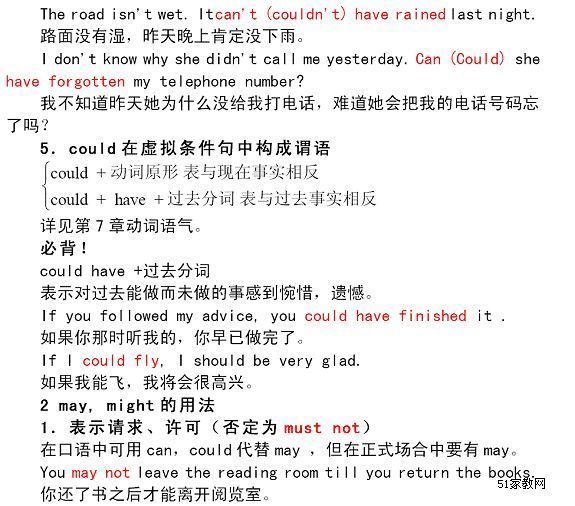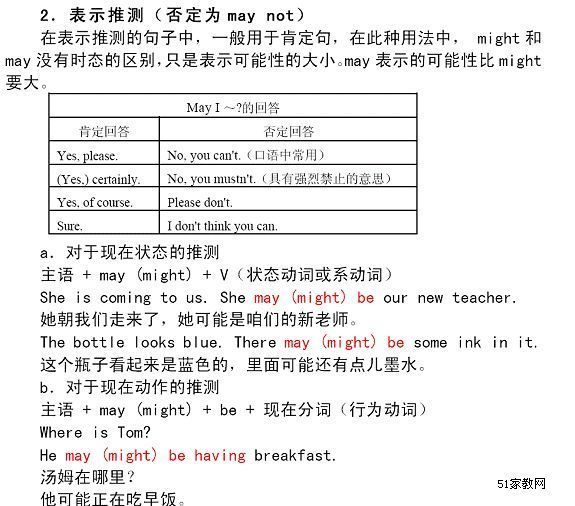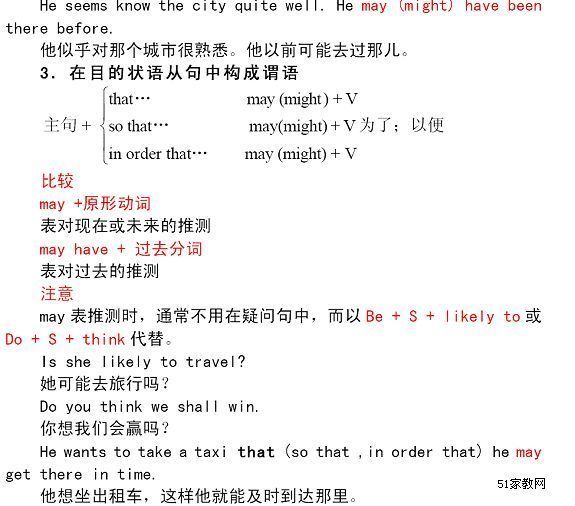否定句:主语+ can, may, must + not +动词原形
疑问句:Can, May, Must + 主语+动词原形?
1 can(could)的用法
1.表示能力;能;会(=be able to)He can speak English.
他会说英语。
Mary can (=is able to) type well and her mother could type well when she was young.
玛丽打字很好,她妈妈年轻时打字打得也很好。
注意
can 表“能力”时的时态变化
现在式can 过去式could将来式be able to 完成式been able to
I’ll be able to help you tomorrow.
我明天能帮助你。
He is ill. He hasn’t been able to go to school for one week.
他病了,他已经一周没去上学了。
说明
can 表示“能力”时,和be able to 相当,许多场合都可以互相替换。但当叙述过去经过一番努力才能完成的事情,不可用could,只能用 was (were) able to。
He could(=was able to) swim when he was six years old.
他六岁时就会游泳了。
(叙述一般的能力)
He was able to swim half-way before he collapsed.
在他筋疲力竭以前已游过了一半。
(指经过了相当的努力,所以不有could)
2.表示可能,能够
I’m sorry, I can’t do that.
对不起,我不可能做那个。
I can draw a horse in five minutes.
我能够在五分钟之内画好一匹马。
A computer can’t think for itself ; it must be told what to do.
计算机不能自己思考,它必须按照人类编的程序去做。
3.表示允许;许可(can = may, can’t = must not)
表示允许时可用can,could,may,might 表达,它们没有时态上的差别,只是could 比can,might 比may 语气上要客气。(用can 或could表示“许可”,虽然很普通,但正式、庄重的场合用may 或might 为宜。)
Could I borrow your dictionary?
劳驾,我可以借你的字典用用吗?
Yes, of course you can.
当然可以。
Could (Can) you tell me how to get the zoo?
劳驾您能告诉我怎么去动物园吗?
Mr. Li asked me whether I could go with him.
李先生问我是否可以跟他一起去。
(此句中could 不能用can 代替)
(间接引语中主句是过去时(asked)从句要用过去式)
注意
在间接引语中用could 表示过去的“允许”,见左例。
4.表示推测(专用在疑问句和否定句)
在表示推测的句子中,一般用于否定句和疑问句中。在此种用法中
can 和could 没有时态的区别,只是表示可能性的大小,can 表示推测的
可能性比could 要大。
a.对于现在状态的推测
否定句:主语+can(could)+ not +动词原形
(原动词或状态动词)
疑问句:Can(Could)+主语+动词原形?
(状态动词或系动词)
The young girl can’t (couldn’t) be our new chairman.
这位年轻姑娘不可能是我们的新主席。
Can (Could) the news be true?
这消息能是真的吗?
b.对于现在动作的推测
否定句:主语+can(could)+ not + be +现在分词
(行为动词)
疑问句:Can(Could)+主语+ be +现在分词?
(行为动词)
He can’t be reading in the reading room, for I saw him in
the street just now.
他不可能在阅览室看书,因为我刚刚在街上看见他。
Mary studies hard. Now she can’t (couldn’t) be sleeping. She must be studying.
玛丽学习努力,现在她不可能在睡觉,她肯定正在学习。
It’s too late. Can (Could) they be doing the experiment?
太晚了,他们可能还在做实验吗?
They must (may) be arguing. But I am interested in what they can (could) be arguing.
他们肯定在争吵,我感兴趣的是他们可能在争论什么呢?
说明
cannot, can not 两种写法因人而异,但can not 较为普遍,cannot 有时被认为略为正式及加强语气之用法。
c.对于过去事实的推测
否定句:主语+can (could) + not + have + 过去分词
疑问句:Can (Could) +主语 + have + 过去分词?
He can’t (couldn’t) have watched TV yesterday for he knew they would have an exam. He must have gone over his lessons.
昨天他不可能看电视,因为他知道快要考试了,他一定在复习功课。

May (Can, Could, Might) I have a talk with you?
我可以和你谈话吗?
May I use your pen?
我可以用一下你的钢笔吗?
Sure./ No, you can’t.
当然可以了。/不,不可以。
May (Might) I come into the room to see my mother?
我可以进房间看看我母亲吗?
Yes, please. /No, you mustn’t. She needs to have a good rest.
可以,请进吧!/不,你不能进。她需要好好休息。
说明
may 表示允许时,也可用might 代替,might 不表示过去时,而是表示口气比较婉转。

My mother may (might) be cooking now.
我妈妈可能正在做饭。
c.对于过去事实的推测
主语 + may (might) + have + 动词的过去分词
Where were you last night?
你昨天晚上在哪儿?
I might have watched TV or have gone over my lessons.
我可能在看电视或在复习功课。

I arrived at the airport earlier in order that (so that,that)I might meet him.我早早地就到了机场为了能接到他。
4.may 有时可以表示祝愿
May you succeed.
祝你成功。
说明
may not 有三个意思
①作“不可以”解,表不允许(=must not)
回答 May I⋯?答句中的may not 为“不可以”之意。
May I go ? No, you may not(=must not).
我可以去吗?不,你不可以。
②回答can⋯?答句中的may not 为“可能不”之意。
Can it be true? It may be, or may not be.
这可能是真的吗?可能是,也可能不是。
③may not 也表示“可以不”
You may not go.
你可以不去。
必背!
may/might 的惯用语
①may well +动词原形(=have good reason to) 理所当然
You may well say so.
你有足够的理由这样说(你说得对。)
②may (might) as well (=had better) 最好
You may as well say so.
你最好这样说。
③may as well +动词原形⋯+ as +动词原形
与其⋯⋯不如⋯⋯;最好⋯⋯而不要⋯⋯
You might as well throw your money away as lend it to him.
你把钱借给他,还不如把它丢掉。
3 must , have to 的用法
1.表示必要性,作“必须、应该、一定要”解如果表示主观看法,表示有做某一动作的必要或义务时,即必须做什么、应该做什么时一般要用must,表示是自己的职责。
Everybody must obey the rule.
人人都必须遵守制度。
I must do it myself.
我必须自己做。
Father is sleeping. You mustn’t wake him up.(语气强烈)
爸爸在睡觉,你一定不要叫醒他。
Must I wake him up?
我必须要把他叫醒吗?
Yes, you must.
是的。
说明
must 的否定
①must not
表示禁止,意思是“不可以”,“不许”
②don’t have to (=need not)
表示没有义务,没有必要。
(回答Must~?问句时,它的否定回答,按意思要求大多当“不必”解,所以要用need not 或don’t have to 表示)
比较
must 和have to 的区别
must 含强烈说话者的决意(表示主观的看法)
have to 则表外力环境或习惯所使然(即表示客观的必要,作“不得不”解)在口语中have got to 可代替must。
You must obey your parents.
你必须服从父母亲。
My father is ill. I have to stay at home to take care of him.
我父亲病了,我必须(不得不)留在家里照顾他。
注意
must 的时态
过去式:had to(但在间接引语中可用must)。
将来式:shall (will) have to
No, you needn’t.(No, you don’t have to.)
不,你不必。
You mustn’t go. =Don’t go
你不能走。别走。
I thought I must help him.
我想我必须帮助他。
Last week we had to have a party for her.
上周我们不得不给她开个晚会。
Next year you will have to finish your schooling.
明年我将不得不(必须)结束你的学业了。
They have had to answer the same question three times.
他们已不得不三次回答这同一个问题了。
2.表示推测
must 在用于表示推测的句子中,一般用于肯定句。它的肯定程度比
may,might 要大得多,一般译为“肯定”。
a.对于现在状态的推测
主语+ must +V.(状态动词或系动词)
He must be in his office for he called me from there five minutes ago.
他现在肯定在他的办公室里,因为他五分钟前刚从那儿给我打来了电话。
Listen. There must be some children in the room.
听,房间里肯定有一些孩子。
b.对于现在动作的推测
主语+ must + be +现在分词(行为动词)
Put on more clothes. You must be feeling cold with only a shirt on.
多穿点儿衣服,你只穿一件衬衣,肯定觉得冷。
Mr. Li must be cleaning the room.
李先生肯定在打扫房间呢。
c.对于过去事实的推测
主语+ must +have +过去分词
说明
You must not (mustn’t⋯)
等于否定的祈使句。
比较
道义上的必要时,用ought to do sth.
I feel I ought to speak out.
我感觉我应当说出来。
必背!
must +原形动词
对现在的推测
must +have +过去分词
对过去的推测
must be +现在分词
对将来或现在正在⋯的推测
The road is wet. It must have rained last night.
路是湿的,昨天晚上肯定下雨了。
I didn’t hear the phone. I must have been asleep.
我没听见电话铃响,我肯定睡着了。
I rang your flat yesterday. A man answered but I didn’t
recognize the voice.
昨天我给你单元(家)打电话,一个人接了电话,但我没听出来是谁的声音。
Oh, it must have been my brother Peter.
哦!那一定是我哥哥彼得。
注意
must have +过去分词若用于虚拟语气的主句中时,可表与过去事实相反。
You must have caught the bus if you had got up earlier.
如果你早一点起床,你一定赶上那一班公共汽车。
(事实上没有赶上公共汽车)
情态动词表示推测的用法
肯定:用must →may→ might
否定:用can→could
(must, might, could 不表示时态;而表示推测程度由强→弱)
①对现在情况推测时
肯定:must, may ,might +be
must, may, might +be doing⋯
否定:can, could + not + be⋯
can, could +not +be doing⋯
疑问:Can, Could + be⋯?
Can, Could +be doing⋯?
②对过去情况推测时
肯定:must, may, might +have been⋯
must, may, might + have done⋯
否定:can, could +not +have been⋯
can, could +not +have done⋯
疑问:Can, Could +have been⋯?
Can, Could +have done⋯?

